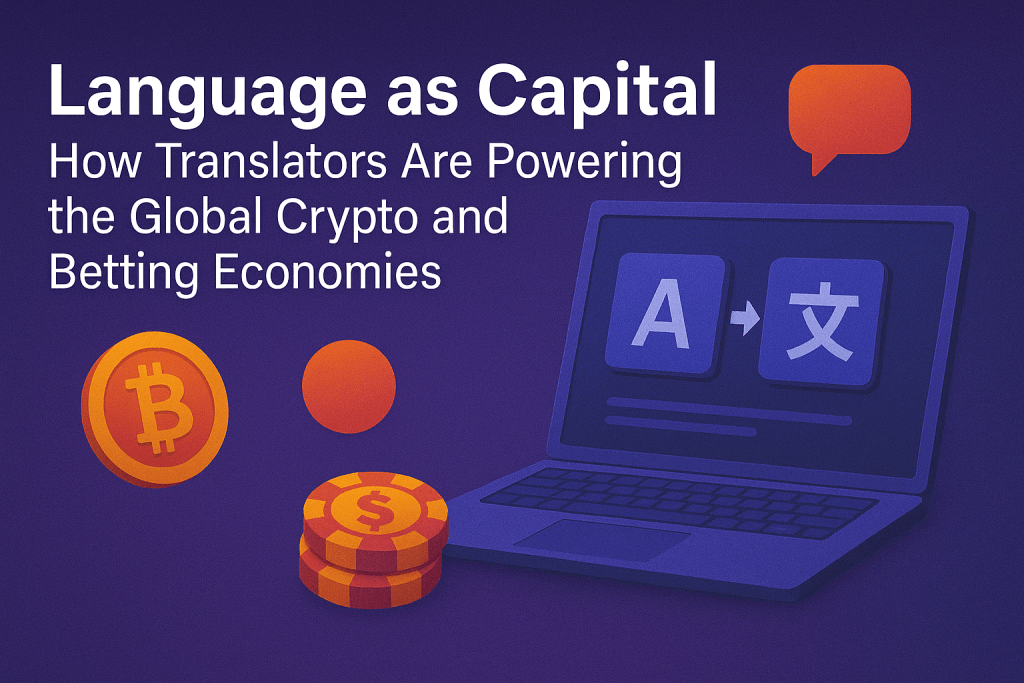In the modern digital economy, translation has evolved far beyond its traditional role. Nowhere is this more apparent than in high-growth sectors like cryptocurrency, online finance, and international betting. These industries rely heavily on multilingual content to reach global audiences, build trust, and maintain compliance across jurisdictions. For professional translators, this intersection offers compelling opportunities—and unique challenges.
The explosive growth of decentralized finance (DeFi), digital wallets, and crypto-based gaming platforms is reshaping how businesses communicate. As these industries continue to expand globally, so too does the demand for nuanced, accurate, and context-sensitive translations that can adapt to diverse linguistic, legal, and cultural landscapes.

Translating for High-Stakes Industries: What Makes It Different?
Financial and betting sectors operate in environments where clarity and compliance are critical. A single misinterpreted phrase in a trading platform’s disclaimer or an ambiguous bonus term in an online sportsbook can result in regulatory scrutiny—or worse, loss of user trust. This means translators are not just converting words—they are safeguarding reputations.
Specialized translators in this domain must balance precision with persuasive copy. Their task is to accurately convey complex concepts—like smart contracts, risk disclosures, staking protocols, or betting odds—in language that is not only legally sound but also accessible to everyday users.
Building Trust in the Global Betting Market
Trust is currency in both finance and betting. The challenge is compounded when platforms aim to serve audiences across dozens of countries, each with their own languages, laws, and cultural attitudes toward gambling or crypto. That’s why localization—rather than just basic translation—has become essential.
For instance, platforms like sky-hills.com illustrate how financial and gaming companies are embracing multilingual strategies to stay competitive. These platforms tailor their content to diverse markets, ensuring that promotional language, transaction guides, and responsible gaming policies align with local expectations. In such cases, translators aren’t just linguistic intermediaries; they are cultural consultants ensuring the message resonates and complies.
The Translator’s Toolkit in Crypto and Betting
Working in these complex fields requires translators to have specialized knowledge, not just of the language but also of the subject matter. Key tools and techniques include:
- Glossaries of Key Terms: Essential for maintaining consistency in technical vocabulary such as “blockchain,” “decentralized exchange,” or “over/under betting.”
- Translation Memory (TM): Helps streamline workflows and maintain consistency across recurring terms in financial statements, terms and conditions, or promotional campaigns.
- Localization Platforms: Tools like Lokalise, Phrase, or Smartling allow real-time collaboration with developers and content managers, especially in agile crypto startups.
In high-velocity markets, accuracy and speed are equally important. These tools help translators deliver consistent, high-quality work under tight deadlines.
Regulatory Sensitivity and Legal Implications
One of the most sensitive areas in crypto and betting translations involves regulatory compliance. Each market may impose different requirements regarding how financial instruments or gambling services can be promoted.
| Region | Key Consideration |
|---|---|
| European Union | Must comply with MiFID II and GDPR; disclaimers required. |
| USA | Varies by state; betting legality differs regionally. |
| Japan | Gambling is largely restricted; crypto is tightly regulated. |
| Latin America | Varies widely; increased crypto adoption requires localized education. |
Translators working with such content must be familiar with the nuances of these regulations—or work closely with legal teams to ensure accurate alignment. In some cases, even the tone of translated content can have legal consequences, especially in regions with strict advertising codes for betting.
Crypto and Betting: Shared Challenges for Translators
Despite their differences, the crypto and betting industries share several linguistic challenges:
- Dynamic Terminology: With rapid innovation, new jargon emerges constantly (e.g., “yield farming,” “gas fees,” “live odds,” “in-play betting”).
- User Education: Much of the translated content is educational, guiding users through unfamiliar systems like blockchain wallets or sportsbook interfaces.
- Tone Management: Striking the right tone—authoritative for financial content, engaging for betting promos—is key to maintaining credibility and driving user action.
- Cross-Platform Consistency: Translation must be consistent across mobile apps, websites, email campaigns, and customer support portals.
Skilled translators who understand the audience and platform context will craft messages that not only inform but also convert—turning visitors into confident users or bettors.
Future Trends: AI, Multilingual Support, and Hybrid Roles
The future of translation in the crypto and betting space is likely to involve even deeper integration with technology. AI and large language models may assist with preliminary translations, but human oversight remains critical—especially in domains where the stakes (financial or legal) are high.
We’re also seeing a rise in hybrid roles: translators doubling as content strategists, UX consultants, or compliance editors. This evolution points to a broader truth—language professionals are not just supporting the fintech and betting boom; they are helping shape its narrative, one translated sentence at a time.
Translators who choose to specialize in this space will find ample opportunity to grow, adapt, and lead as trusted language partners in these fast-moving, globally interconnected industries.

